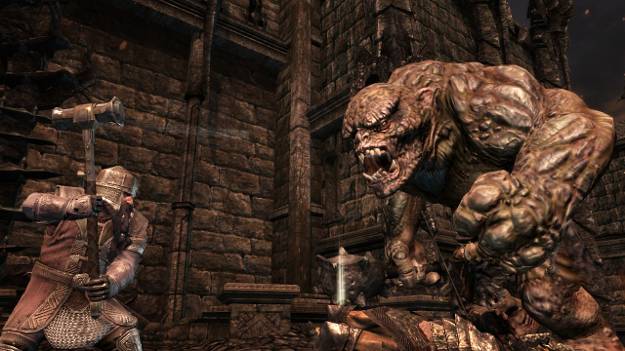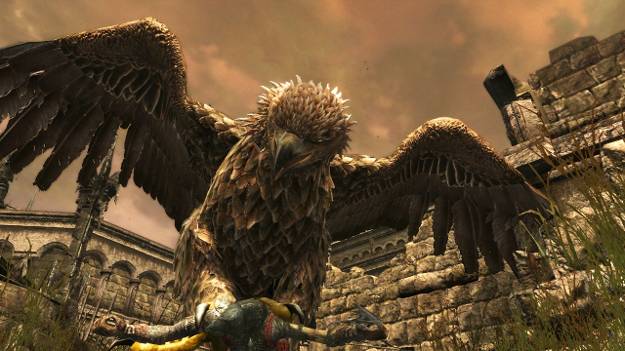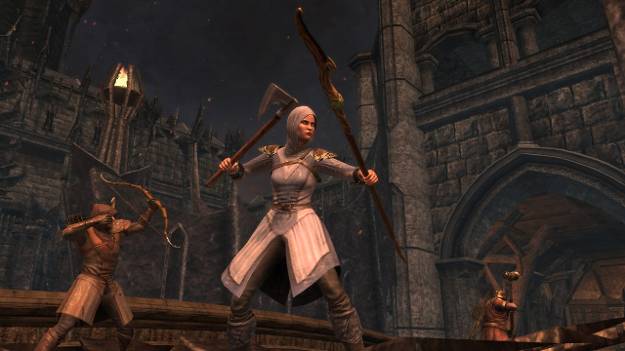War in the North is a new take on the familiar Tolkien environment, with a group of characters travelling Middle Earth during the same period as the famous Fellowship of the Ring. They don't follow the main story of Lord of the Rings, instead, having their own parallel storyline that they progress along. It details the story of an orc rising in the northern lands of Middle Earth; spearheaded by a servant of Sauron. If allowed to continue unabated, the free people of Middle Earth will be in a tough spot as hordes of Goblins, Orcs and Uruk-hai wash over them.
Players get to take on the role of a Human Ranger, Dwarf Fighter or Elven Mage as they battle their way through the storyline. Each of them has a unique set of abilities that they can use to aid them in their battle. However, the way that the abilities are set up doesn't always make the most sense. They have three skill trees that they can gain abilities from, but in many cases it's necessary to put points in all the skill trees in order to upgrade one ability. Leveling up can be cumbersome due to this, causing players to have to take skills they don't necessarily want to upgrade ones they do. And in at least one case, the skills can be incredibly broken. The Dwarf has the ability to pick up an explosive bolt that when leveled properly completely decimates enemies and eliminates any element of fun as the battles are over in two seconds flat.

And when players aren't using broken abilities to make the battles incredibly easy, the fights tend to fall more on the annoying and frustrating side. In order to simulate difficulty, the creators either horde you with enemies or give some of them the ability to knock your character down. None of these is all too enjoyable as the go-to strategy becomes: Run around, shoot and hit from a distance and move in when they're staggered or have their backs turned. The game truly lives up to the term 'Hack and Slash'; once characters actually move in for combat the fighting itself is incredibly repetitious. One button controls a regular attack while another controls a heavy attack, meaning that most up close combat involves players alternating between two buttons with no real variation. The characters do have other special attacks that they can do, however skills need to charge up after they've been used, limiting their actual usage. Even then they don't really add much to the combat (with the notable exception of the Dwarf's broken explosive bolt). The boss fights in the game are prey to poor combat design, with fights with them being more annoying than challenging.
The characters themselves are difficult to play solo, each having their own unique weaknesses that make them hard to manage by themselves. The Dwarf, while having the easiest time in straight up combat, loses health at a remarkable pace, leaving him susceptible to the same 'run around' strategy as the others. The Ranger, has a lot of difficulty taking care of himself in flat out melee combat; however his good (read: a little broken) ranged skills need time to charge before he can use them again. And the Elf is the most reliant on the 'run around' strategy. The problem with her though, is that her ranged attack not only uses up her magical energy; it needs time to recharge before she can fire any more magical bolts. Their individual design is poorly thought out and noticeably lacking.
Cooperative play is easier than solo play; however it has its flaws as well. Pro tip: if you're only playing two player cooperative, someone needs to play the Dwarf. You may even want to play the game solo as only the Dwarf. Otherwise his AI will constantly get him killed and force the Ranger and Elf to have to rush to revive him while defending against the hordes of enemies. And it's impossible to maintain the safe and reliable 'run around' strategy when crouching to revive a teammate, meaning that they have a good chance of getting killed trying to save him. Letting him crawl around on the floor isn't really an option however, as he is a very useful distraction that's missed when not there. Having multiple players in the game does make it more enjoyable though, as you and your friends can enjoy the storyline of the game while slashing your way through the enemies. Getting annoyed by enemies knocking you around is always less annoying when shared with friends.

As with any good hack and slash, one of the main components is the armor and weapons that you use over the course of the game. The equipment that the game gives over is pretty remarkable; over the course of the storyline you have the option of completing a few side quests that net you a choice between some pretty badass equipment. Looted containers can also yield some really good equipment, allowing you to pimp your character out pretty well.
One of the genre staples that the game employs is having weapons that can do different types of damage, such as lightning or fire. However, I haven't really seen an effect based on the type of damage. I never saw an orc go up in flames from having too much fire damage done to him, for example nor do enemies seem to have elemental weaknesses to exploit. But even still, being able to see your armor and damage ratings go up at a steady rate due to equipment is pretty nice. It can even be shared between characters; solo players can give equipment to their AI counterparts as well as trading to cooperative buddies. And it's very easy to accumulate wealth in the game, making buying equipment when necessary fairly easy.
However your inventory itself leaves a bit to be desired. Each 'category' has a limited amount of available slots for holding equipment and once they're full, you can no longer carry items in that particular category, be it boots, weapons or miscellaneous. Miscellaneous items that are only good for selling fill the same category as health and mana potions that only stack in portions of ten. And when the category that holds them is filled up you cannot put anything else in there. This means that while you have more than enough room for all the bracers you can pick up (and who is going to carry more than one or two at a time?), you may run out of room for sellable items. Instead of having an open inventory where you can place any item you want into the available slots, the game unnecessarily limits you.
Here is where the game design gets even more wonky. During solo play the AI controlled characters level up on their own, which is very helpful. Over the course of the game they gain levels as you do and start using more advanced abilities. However, you cannot assign the abilities that they use unless you completely switch to them and start using them instead. And while they generally use the items you give them, they sometimes and inexplicably switch to other items of their own accord. It was pretty frustrating to see them stop using the uber weapon I gave them and start using some other hunk of metal they 'picked up' on their own. And you cannot retrieve the items given to them either, meaning that they cannot be sold or used by anyone else at any later point.

Players might assume that the solution to this would simply be to switch to the other AI controlled characters at the allowable points; between levels the player is given the option to switch characters. However, when you switch characters any equipment previously given to them is suddenly not there. They start off with their starting equipment and whatever unequipped items you had in your inventory. To add insult to injury, the player you were previously playing no longer has on any of the badass equipment they'd been using. So while you can now pick the abilities that your 'second' character is using, you lose your equipment. Some of the items you had in your inventory do carry over, but all in all it's a very poorly constructed and ill thought out way to allow the player to switch characters.
Another feature they put into the game are secrets that the characters can find. The Ranger can find stashes of equipment and arrows scattered about the world, the Dwarf can find walls that can be broken to reveal treasure and the Elf can find hidden Elvish places as well as herbs and items to make potions. Over the course of the game, the only person who seemed to have reliable 'secrets' to find was the Ranger. Most of his stashes hold arrows which are vital to him being useful in the game. The treasure that the Dwarf finds can be useful as well, but the Elf barely finds anything worth using. She has very few hidden places to find, which again simply hold treasure. Her main thing seems to be finding herbs to make potions. The only useful potions that she can make are health and mana. She has multiple other potions that she can make, however they can only be used by going into the inventory screens and selecting them, which makes it very cumbersome to use any of them in the middle of a fight. Who really wants to get their face torn off while trying to use a potion that temporarily gives a little boost? Added to the difficulty is that the game randomly shuffles around the order of items in your inventory. So if I put a potion in the bottom leftmost slot, it may now be in the upper right side when I go back in to use it.
The one main thing that the game has going for it is storyline. The main Lord of the Rings storyline runs alongside the one for the game; the characters meet the members of the Fellowship briefly in Rivendell. To the games credit, however, the player is still able to feel like the star of the game. As you run around in the Northern Lands of Middle Earth you get to battle an entire army of enemies that are focused on a task that doesn't involve Frodo and the One Ring. You get to meet some interesting characters as you go along, travelling to a multitude of locations in the world. I was actually interested in seeing what turn the story would take next and where the characters would have to go to resolve the story. It's not a world shattering or brilliantly written out story, but it was engaging in its own way.
Lord of the Rings: War in the North isn't a horribly bad game. It's just not as well thought out and as well designed as it could be. By myself I found the game incredibly repetitious and annoyingly frustrating; with a friend the game became much more enjoyable simply be virtue of having someone else to share the experience with. Played just for the story and taken simply as a hack and slash, the game can be enjoyed without too much difficulty. Just be prepared to play around with the abilities until you find a setup you like and be prepared for some annoyingly repetitious fights.